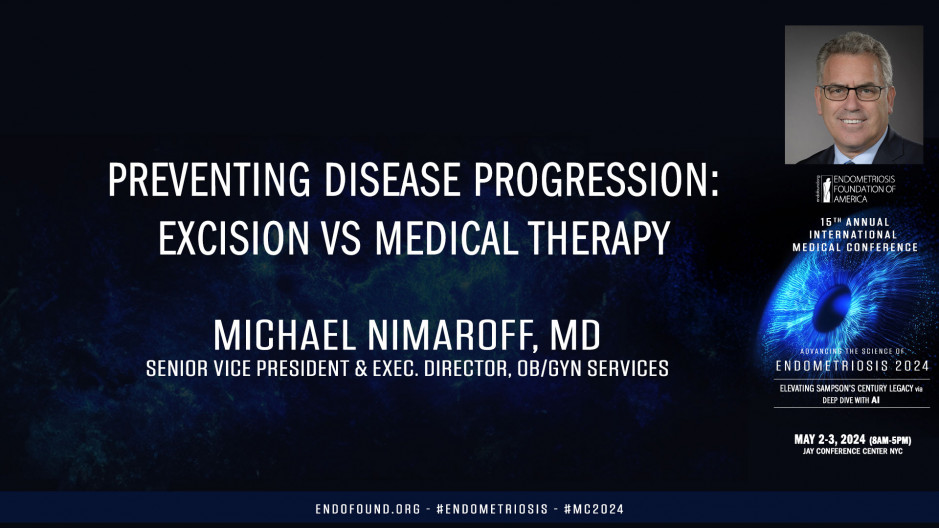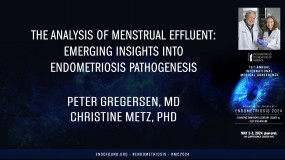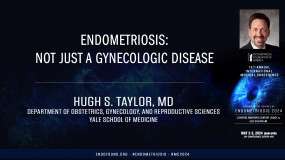International Medical Conference
Endometriosis 2024:
Elevating Sampson’s Century Legacy via
Deep Dive with AI
For the benefit of Endometriosis Foundation of America (EndoFound)
May 2-3, 2024 - JAY CENTER (Paris Room) - NYC
Appreciate it. Always appreciate the invite and I'm glad we have a nice casual group here. So it's good. I've had a really rough 24 hours, so I don't even want to, I do need to get it off my chest, but I won't. I'm not going to talk about it. But anyway, so getting back to the point in hand, I mean preventing disease progression, right? Because sort of a lot of what it's about with endometriosis and what's the best way to do this or do we know? And this is something that I am always interested in myself and when I prepare lectures always, I want it to be a topic that I find interesting. We always learn when we're preparing, but is it excision medical therapy? Is it a combination? And especially when we think about what the future is coming in endometriosis with noninvasive, non-invasive diagnosis, really around the corner, it really does become even more of a question about what is the best way we should do this and manage it.
Okay, so just my disclosure, nothing to do with this topic, but again, treatment options, you guys all know, but conservative therapy, medical therapy, surgical excision, ablation, and especially conservative therapy, do we need to treat at all, right? We're going to have, if we know someone has diagnosis, endometriosis based on imaging or one or a test, do we need to treat medical therapy, surgical precision ablation of all visibles of lesions or a surgical treatment filed by medical therapy? That's basically it. And so when we look at this and always, this is how I try to look at my patients is, and endometriosis is really it's focus and it's a personalized treatment. I mean we say this about a lot of things, right? It's always personalized patients, shared decision making and all those nice words, but with really, to me, it really is that, I'm going to skip the first one for a minute, but it's an infertility patient.
If the goal is all about fertility, the question is, is that patient, should they have surgery, medical therapy or just go or just proceed with their assisted reproduction? And obviously I think from, without spending too much time, this, it's depending on extended disease, there's more and more where I'd say in the, I'm say going back a few years, it used to be, no, just go ahead and do your assisted reproduction. More and more. I think many of us who do this, we're getting more and more of our patients sent from the fertility doctors who want treatment or want their patients to be treated. They're doing testing, they're doing biopsies, and they feel a lot of their failures. And again, there's good data on this that failures are associated to obviously endometriosis and especially there's some really reasonable data specifically obviously on DIE, pelvic pain organ involvement.
Same story, right? It's, it's all personalized. The question is, and this is one, and to me main part of short this talk is the asymptomatic patient or the mild patients with mild symptoms, should we be operating on these patients? Should we be putting 'em on medical therapy or maybe should we is the answer we do nothing? And finding these answers and evidence-based is a little bit of a challenge. And I'm sure it's not only unique for me. And again, as medical therapy options have expanded, especially with the GnRH antagonists and others and all the choices for the different progesterone therapies with lark, et cetera, we get for many patients, we have reasonable symptom control. The question though, again, what about disease progression? Because that's what to me, we can have symptom control with medical therapy, we can have symptom control with surgical therapy, but is there one that's better than the other from that standpoint? I'm just going to just go back a little bit about just the GnRH antagonist, very effective in reducing pain. So with up to 75% of patients who are on the 200 twice a day regimen with a good result for pain. But again, does that tell us about disease? It doesn't tell us yet the answer. What about disease progression?
A little bit of an unknown. There's a lot in the adolescent population. And I find it interesting because again, this is probably one of the more important populations is that certainly we know endometriosis is also present and active in adolescence and even a significant number of them actually even have, can have deep infiltrating endometriosis. But so again, what's the status on disease progression based on what therapy's done? And when you look at the evidence, it's actually all over the place where there is some that says there's no progression. Some says there is progression. So it really is, there's not with treatment. So it's always something that's still, I say there's a question mark, but one of the things that I always think about when I'm thinking about my approach is when we think about all the different, the pathophysiology on today, more current path ideas about where does this all come from? It's sort of almost leads you to believe that why surgical therapy alone would be the answer for preventing disease progression. And if anything, it's more to this sort of say, Hey, we got to treat this more from a medical when we're talking about prevention.
And so one of the things that I really hadn't thought about much is there's more talk about, I'm going to see one of the next studies, but this is the genetic epigenetic theory, but there's multiple, obviously we have still multiple theories about development endometriosis, but I forgot this whole microbiome theory that's out there also that it's also related to our micro microorganisms as well. And when you think about that, and again it leads to the whole idea that clearly if we're really talking about disease progression prevention, it's got to involve some suppression. It just from our own philosophy and belief in how this whole thing starts just doesn't make sense that surgery alone is the answer. Not that surgery's wrong, obviously for symptom control and the other pieces. It's just that I don't think alone is necessarily the answer. This is old, but I don't know about you anybody. I'm getting a lot of referrals from infertility docs with elevated CA one 20 fives. I dunno if anybody else is getting that. I hate that.
But for whatever reason, I find in this neck of the word world, they're doing a lot of CA one 20 fives and sort of using that as, let's say a reason for treatment or at least to say, Hey, this patient who was treated needs additional treatment or whatever. And so I was looking back some of the, this one's not that old, but basically we know CA 1 25 absolutely is elevated in our patients, especially with significant endo and adeno in particular the adeno patients also. And they do improve with surgery, which is excellent. But it's, the question is what is the role of monitoring and everything? And I'm going to say again, also very equivocal data, but there's definitely seems to be some role in the monitoring. Again, I don't know how it's again, correlating to clinical in a clinical space. Like if saying from, Hey, if your CA one to five is lower, you're going to have a higher success rate in getting conceiving and all those things. I don't necessarily have that answer, but this is even older study. But surgical treatment does reduce levels progesterone, but this is in the days of ole use. But danazol did lower the levels too. The question is, and also GNR H agonists have been shown to decrease the A 1 25 levels.
So in general, but they do rise again. And this is where I think our approach with patients, if we're talking about disease prevention or preventing progression, is really it's chronic treatment. It's chronic suppression. Yeah, we can play around with it. It could be six months of this, it could be two years of this or whatever. But I think it's going to come down to that. We need to have patients who really chronically suppressed. Same thing. We see there's data on some of, let's say the naturopathic ways, CETIN and others all support that. There's been studies showing decreased size of lesions with some of these things. So again, it could be a combination of things. It's not one answer to any of this, but certainly there's definitely some evidence all around. And I'm going to show this a couple others. This is one some that you learned because talking about the microbiome, but antibiotic therapy, this is in the mice population, but decreased progression using antibiotics, using Flagyl, really I just found it interesting. And again, other targeting other receptors. Again, also in a model to show that with intervention, we're showing actual prevention and progression of disease. And I think that's what it comes down to. So I like to look at it and separate it out and say we have the patients who are, it's all about their symptoms, but then there's a significant subgroup, especially the younger patient, it's all about preventing disease progression.
This was an interesting study about surgery and disease progression. Now these were all patients who were re-opt. So the subset of patients were, it's sort of a skewed population. These are all patients who had re-op and again, time to, and these were patients who just had excision surgery, but there was progression in 66% of patients even with mild endo. And even 39% of those with endometriomas progressed also. So just one more piece, but I think we all see that. I mean, we know to me patients specifically with endometriomas, you're going to treat the endometrioma if it's one that you need to treat or whatever. If we don't do anything that patient, it's coming back at some point. It's absolutely not the answer alone.
So this 13 randomized controlled trials, this is in and four in this study, post-op recurrence determined by imaging or symptoms. There was significant reduction of recurrence with post-op suppression. And I think that's really the key. I mean, yes, we still need to do surgery on many patients. I'm not trying to say we don't. It's just that I think it always has to include or should often include some additional therapy. Hormonal management and disease progression. They get 58 articles. There's certainly a significant number that didn't have efficacy. So if it's not working, that's a whole nother story for a reason for surgery. But for those 17 to 34% had return of symptoms after completion of treatment. But that's not a surprise either. Many had again, prolonged the positive effect. But even with medical, same story with medical therapy. Medical therapy for a short period of time isn't the answer either. I think it's more chronic suppression kind of thing. Just again, always about assisted reproduction and then almost done.
I just thought this is IVF treatment. Does that worsen symptoms? Does assisted reproduction doesn't appear to really worsen pain, doesn't increase the incidence of recurrence, only small effect on endometriomas. But deep infiltrating disease may progress with some stimulation, but overall treatment doesn't appear to be necessary and just go proceed with the IVF. And obviously especially with small endometriomas, et cetera, we try to leave them alone. But again, just surgery alone, probably it doesn't solve that pathogenic mechanism of endometriosis. Yes, we are excising disease, but why are we saying only those areas that we excise? We know it goes against it. Just those areas are the only one, then we're done with it. So medical therapy is considered first line for most women with endometrial prove the symptoms. But also it helps planning adequate timing of surgery with or assisted reproduction and certainly to prevent post-surgical recurrence.
I think it's really key. So medical therapy used in many different ways, but again, the choice and the approach is all about the age of the patient, the pain, what's their symptoms. Clearly surgery has benefit and is effective in treating their disease. No question. But the question is to me is just again, is it enough alone? And I think it's depending on the patient, generally speaking, we should try to always add some suppression along with that. And like I said, I think as I started in the new world, when we have noninvasive testing or especially let's take patient with some mild, if you take the young patient with dysmenorrhea who we're now testing, we're saying, Hey, you have endometriosis, does that mean we right away operate on them all or do we go a different path with that? And I think without any other evidence, I think of significant disease, I think I'm going to say we probably, that group, we're going to end up going with suppression more, but the jury's still out. So thank you very much.










